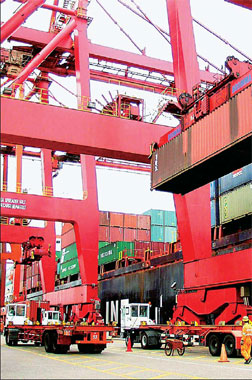|

A scene at Ningbo port. China's exports have remained strong despite a global economic slowdown. [China Daily]
|
When Premier Wen Jiabao warned in March that this year could turn out to be the most difficult for the Chinese economy, few could have known the depth of the challenges and complexity embedded in that forecast.
"Not quite six months into the year ... China has already suffered more shocks to its economy than the previous few years combined," said Wang Tao, head of the China economic research unit of UBS, in a research note.
International oil prices have been closing around the psychological threshold of $150 a barrel, pushing up costs in the industrial sector worldwide.
"Global and Chinese economic growth may, in a sense, hinge on the price movement of oil next year," said Hu Shaowei, senior economist with the State Information Center.
In China's case, oil prices remain a major challenge for policymakers who have vowed to rein in inflation.
The country raised the prices of processed oil products in late June, with further hikes expected to put more pressure on policymakers struggling to control inflation.
Analysts believe that policymakers will not raise energy and fuel prices unless inflation eases significantly, thus mitigating its impact on prices.
"China may continue to raise its oil product prices in line with market demand," said Chen Xingdong, chief economist of BNP Paribas Peregrine Securities in Beijing.
"But policymakers should well manage inflation expectations."
Indeed, the outlook on inflation has become more gloomy not only in developing countries, but also in the developed world - US-borne subprime woes linger and a financial crisis has erupted in Vietnam, setting off alarm bells in other Asian countries that used to rest on its high and stable growth.
"Neither the US nor Europe have shaken off the effect of the subprime problems and they will in turn affect the developing countries, including China, later," said Liu Dongliang, senior currency analyst with China Merchants Bank.
Other challenges facing the country's economy include the impact of recent major natural disasters like snowstorms, the Sichuan quake and floods, which have resulted in enormous losses in lives and property.
The slowing growth of the trade surplus, as indicated by June statistics, as well as the drop in corporate profitability and investment growth, have added to the basket of problems.
Recent visits by top national leaders to major economic powerhouses have been interpreted as moves to assess the seriousness of the current economic downturn, prompting analysts to say that the economy is saddled with real problems.
Despite all the challenges and danger signs, confidence in the Chinese economy remains.
"The economic situation has been better than expected," Premier Wen said late last month.
Slowing, but stable, economic growth is said to be behind that confidence.
"The slowdown in economic growth may not be bad, because it can make the economy more sustainable, which is in line with the country's overall development strategy," said Han Meng, economist with the Chinese Academy of Social Sciences.
In the past five years, the Chinese economy has grown by 10.6 percent on average. Last year, it expanded by a blistering 11.9 percent year-on-year, triggering widespread worry over its overheating.

